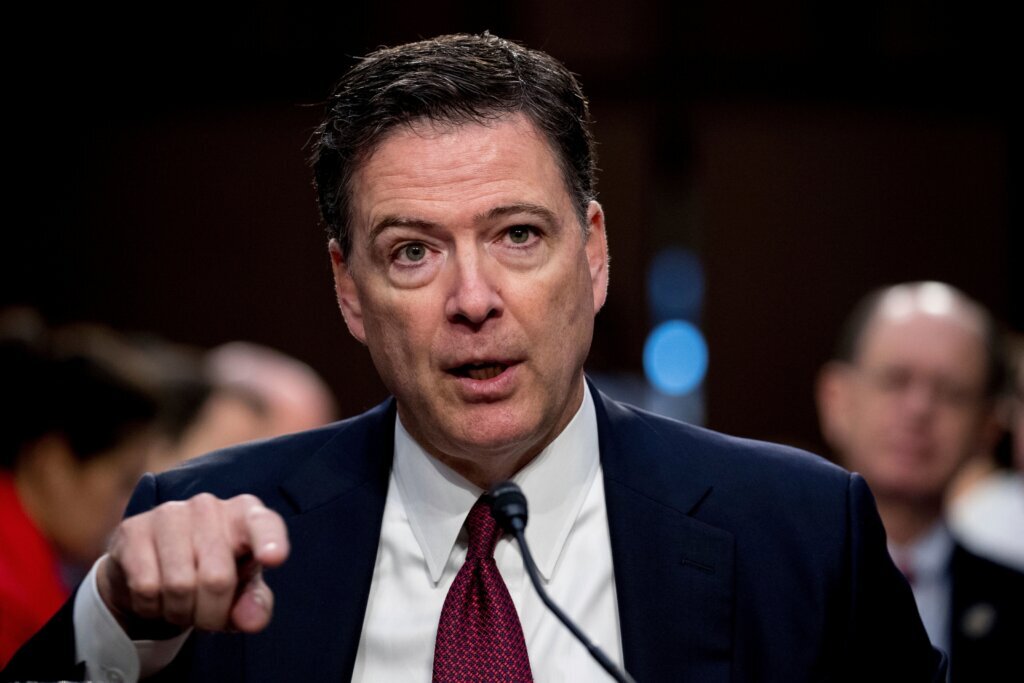WASHINGTON (AP) — The Justice Department urged a federal judge Monday to reject James Comey’s claim that his prosecution amounts to political retribution. Prosecutors argued the former FBI director has failed to demonstrate that he is being targeted as punishment for his criticism of the Republican president.
In their filing, prosecutors defended President Donald Trump’s September social media post demanding action in the Comey investigation, contending it reflects a “legitimate prosecutorial motive” and does not justify dismissing the indictment accusing Comey of lying to Congress in 2020.
The filing highlights the challenging position the Justice Department faces, as Comey and other defendants cite the president’s remarks to seek dismissal of their cases ahead of trial. Comey’s lawyers told the judge last month that the charges must be thrown out because they were brought out of “personal spite” at the president’s direction.
Similarly, a lawyer for New York Attorney General Letitia James—another Trump critic charged in a mortgage fraud investigation—has indicated plans to make a comparable argument.
The Justice Department acknowledged that Trump’s social media posts reflect his view that Comey “committed crimes that should be met with prosecution” and “may even suggest that the President disfavors the defendant.” However, prosecutors maintained there is “no direct evidence of a vindictive motive.”
“The defendant spins a tale that requires leaps of logic and a big dose of cynicism, then he calls the President’s post a direct admission,” the filing states. “There is no direct admission of discriminatory purpose. To the contrary, the only direct admission from the President is that DOJ officials decided whether to prosecute, not him.”
This dispute centers on one of the most closely watched challenges Comey has brought regarding the indictment. His attorneys have cited not only Trump’s public demands for prosecutions of perceived enemies but also the president’s longstanding disdain for Comey, whom he fired during his first term amid the Russia election interference investigation.
Patrick Fitzgerald, former U.S. attorney in Chicago and a longtime friend of Comey, argued that Trump’s social media post urging Attorney General Pam Bondi to prosecute Comey and other longtime foes “constitutes a direct admission of discriminatory purpose to single out a perceived political enemy.”
Separately, the defense is challenging the appointment of a White House aide who was installed as U.S. attorney after the head of the elite office handling the investigation was pushed out by the Trump administration.
The indictment was issued days after Trump appointed Lindsey Halligan—a White House aide and one of Trump’s personal lawyers with no prior federal prosecutorial experience—as U.S. attorney for the Eastern District of Virginia, replacing Erik Siebert.
Trump announced his support for Halligan one day after Siebert resigned amid administration pressure to charge Comey and James.
Last week, Comey’s lawyers requested access to transcripts and audio recordings of grand jury proceedings, suggesting that factual and legal errors may have been presented to the grand jury that returned the indictment. They argue this could be grounds for the charges to be dismissed.
The case accuses Comey of lying to the Senate Judiciary Committee on September 30, 2020, in response to questions about whether he had authorized FBI leaks to members of the media.
The government’s filing outlines numerous communications between Comey and Daniel Richman, a close friend and Columbia University law professor. The exchanges are presented as evidence that Comey encouraged Richman to engage with reporters and share Comey’s perspective on politically sensitive investigations concerning both Trump and 2016 Democratic presidential nominee Hillary Clinton.
Prosecutors argue that these interactions demonstrate that Comey lied to the Senate panel about whether he had authorized disclosures about those investigations to reporters.
However, Comey’s lawyers contend the case must be dismissed because the questions Comey answered—posed by Senator Ted Cruz—were vague and ambiguous, making it impossible for Comey to have had the specific intent to lie.
For instance, they note that Cruz’s line of questioning regarding whether Comey had permitted media disclosures did not mention Richman but instead referenced another individual, former FBI Deputy Director Andrew McCabe.
“In doing so, Senator Cruz never indicated that he wanted Mr. Comey to address the statements or activities of any person except for Mr. McCabe,” Comey’s lawyers stated.
https://wtop.com/government/2025/11/justice-department-defends-trumps-post-as-it-urges-judge-to-reject-comeys-effort-to-dismiss-case/
